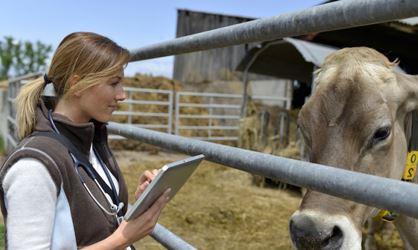



Vaccinate Calves Now For Good Health Through Summer
Spring is a good time to protect your calves from summer illnesses through vaccination. This article from Russ Daly at South Dakota State University (SDSU) Extension's iGrow programme offers some tips for producing good vaccination protocols.Branding season or pasture turnout is a natural time point that lends itself well to working calves and preparing them for the summer ahead.
These preparations typically include a vaccination protocol, meant to protect the animal against ailments they might encounter on summer pasture. A look into the display cooler of any food animal vet clinic will reveal a wide variety of products that could be used in a vaccine programme.

With timing, labour constraints, and the necessity for boosters, there are a lot of potential moving parts to any vaccine programme.
Talk to your veterinarian
There’s no one better to help a beef producer sort out all these moving parts than the local veterinarian. They have experience with and knowledge of the many different vaccines, as well as the disease issues in area herds.
Prior to that veterinary consultation, it’s good for beef producers to first think about what calf health conditions are of most concern and whether a vaccine can help prevent those conditions.
Timing is critical
Another important consideration is the age of the calf when vaccinated. Vaccines are not always able to stimulate the immune system of a very young calf.
Calves, especially those under a month of age, have an immature mature set of immune cells and organs. It’s not that young calves won’t respond to vaccines at all, it’s just that the response will be weaker and more short-term.
There are a few exceptions, however. Intranasal vaccines seem to work well in young calves, stimulating a good local response in the nasal passages as well as systemically.
Clostridial vaccines also seem to garner a response in young calves. Calves older than 6 weeks can respond to certain modified live viral vaccines when subsequently challenged with those viruses.
Read labels thoroughly
Vaccine label instructions should be noted. Some vaccines, especially killed vaccines, require booster doses. Getting calves off pasture for a booster dose is a challenge for many producers.
Does it do any good to give a calf the first dose if they can’t get the booster? We know that when booster doses are given according to label directions, the vaccine should perform as it did when the manufacturer gained its approval to be sold.
Without booster doses, the immune response will not be as robust or long-lasting. Will one dose be enough? If exposure to the pathogen is limited, sometimes it might be.
What health problems can be prevented by vaccinations?
What summer calf health problems might be prevented with help from vaccinations?
First on the list is blackleg. Blackleg is a widely distributed bacteria common in pasture soil, resulting in sudden death of well-doing calves.
Vaccines protect well against blackleg, and calves going out to pasture should get blackleg vaccine, usually in the form of a “7-way” clostridial product.
An increasing number of beef herds are detecting pneumonia in calves on summer pasture. In those herds, it makes sense to attempt to boost calf immunity against respiratory viruses such as IBR and BRSV that can set up severe bacterial pneumonia.
When pneumonia cases have occurred in the past, giving calves an intranasal or a modified-live injectable vaccine against these pathogens is warranted.
Herds that have had problems despite implementing these vaccines may consider vaccinating calves against bacteria such as Mannheimia or Pasteurella.
Some producers use vaccines against Mycoplasma pneumonia, but there is very little evidence that these vaccines do much. Herds experiencing Mycoplasma pneumonia in calves on pasture likely have problems more profound than can be helped by vaccines.
Pinkeye is another scourge that calves face on summer pasture. Many different pinkeye vaccines are available, as well as farm-specific versions. Herds with a history of pinkeye should consider vaccinating calves going out to pasture, but we know these products are very strain-specific and disappointing results are not uncommon.
In many South Dakota herds, anthrax is a constant threat. Although it’s rare for calves to be infected with anthrax compared to adult animals, the vaccine is safe and inexpensive for calves in anthrax areas.
Vaccines can be a valuable tool for cattle producers looking to help keep their calves healthy on summer pasture. Before making any changes to a vaccine program, it’s always best to run those ideas past your veterinarian, in order to make sure those products perform as well as possible.



